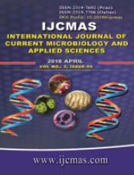


 National Academy of Agricultural Sciences (NAAS)
National Academy of Agricultural Sciences (NAAS)

|
PRINT ISSN : 2319-7692
Online ISSN : 2319-7706 Issues : 12 per year Publisher : Excellent Publishers Email : editorijcmas@gmail.com / submit@ijcmas.com Editor-in-chief: Dr.M.Prakash Index Copernicus ICV 2018: 95.39 NAAS RATING 2020: 5.38 |
Mosquitoes are found throughout the world excluding the place which are completely frozen. Three fourth (3/4) of the existing mosquito species were native to tropical and subtropical region. Mosquitoes are likely to transmit disease to more then two fifth(2/5) of the world population.The major dreadful disease such as Malaria, Chikungunya, Dengue, Filariasis and Japanese encephalitis were transmitted by mosquito bites. In order to reduce the awful diseases, extensive research has been done on mosquitoes for few decades. Vector control techniques face serious threats because of the emergence of resistance to synthetic insecticides. Plant are rich sources of bioactive compounds and synthesize a number of secondary metabolites to severe as defensive chemicals for control the insect pests. Plants offer an advantage over than synthetic pesticide, which used as an alternative to chemical insecticides. The present investigations were carried out to assess the ovicidal activity and ovipisitional deterrence efficiency of aqueous leaf extracts of Tecoma stans against Aedes aegypti. Hatching rate was calculated on the basis of non-hatchability of eggs. The effect of aqueous leaf extract of T.stans on oviposition of Ae. aegypti was determined under two set of conditions (Choice oviposition test, No-choice oviposition test). Oviposition Active Index (OAI) and Oviposition Deterrent Index (ODI) was calculated. The hatchability of Ae. aegypti eggs was decreased when placed in media of aqueous leaf extract. The reduction in percent hatch was inversely proportional to the concentration of aqueous leaf extract used.The aqueous leaf extract of T.stans were found to deter mosquitoes from oviposition. Oviposition Active Index and Oviposition Deterrent Index indicated a low preference of Ae. aegypti to leaf extract treated medium for egg laying. This study suggest that, the aqueous leaf extract of Tecoma stans should be considered as promising anti- mosquito agent.
 |
 |
 |
 |
 |